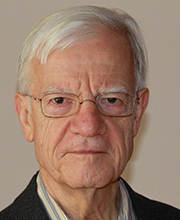
Five questions to Al Hofmann

Albrecht “Al” Hofmann is Emeritus Director of the Geochemistry Division of the Max Planck Institute for Chemistry in Mainz (Germany). Currently, he is also Adjunct Professor and Visiting Senior Research Scientist at the Lamont-Doherty Earth Observatory in Columbia University (USA), Adjunct Professor at the University of Nanjing (China), and Guest Professor at the China University of Geosciences in Wuhan (China). Al’s research focuses on the isotope and trace element geochemistry of Earth’s mantle. Al is also a former president of the EAG and the 2015 Urey Award Medallist.
WHAT OR WHO INSPIRED YOU TO BECOME A GEOCHEMIST?
The “inspiration” to become a geochemist came from a rather coincidental turn of events. When I got to grad school at Brown [Brown University, USA], I had planned to become a structural geologist, but Bill Chapple, the structural geologist at Brown, had just gone back to Caltech [California Institute of Technology, USA] to redo and/or extend his PhD thesis because his original work had just been scooped by Biot. Bill was too busy at the time to answer my inquiry from Brown, so I took a geochemistry course from Bruno Giletti and decided that geochemistry could also be interesting. Bill and I became good friends, but it was too late for structural geology.
WHICH CAREER CHOICES WERE THE MOST IMPORTANT?
I didn’t really make career choices. Industry didn’t offer me any jobs, but I did have offers of attractive postdocs, so I went that route. One smart thing I did was to take my American wife to Germany for a year-and-a-half after my PhD so she would get an idea what that country was like. That proved to have been a wise choice, when the Max Planck directorship was dropped into my lap ten years later.
WHAT HAS BEEN YOUR GREATEST OBSTACLE?
I encountered very few obstacles personally. My only lasting regret is that my initiative (soon after the unification of Germany) to start a new Max Planck Institute to study deep-Earth geophysics and geochemistry was shot down.
WHAT INSPIRES OR MOTIVATES YOU?
The luxury of curiosity.
WHAT DO YOU THINK ARE THE MAIN CHALLENGES FOR GEOCHEMISTRY IN THE FUTURE?
One major challenge in geochemistry is, and will continue to be, the ability to actually analyze most or all of the atoms extracted from a very small sample in modern micro-analytical methods. We are still throwing most of the ions away. Another major challenge is in the application of “big data” approaches to recognize and solve geoscience problems. Our current geochemical databases are just a beginning.
Interview carried out by the EAG Communications Committee
